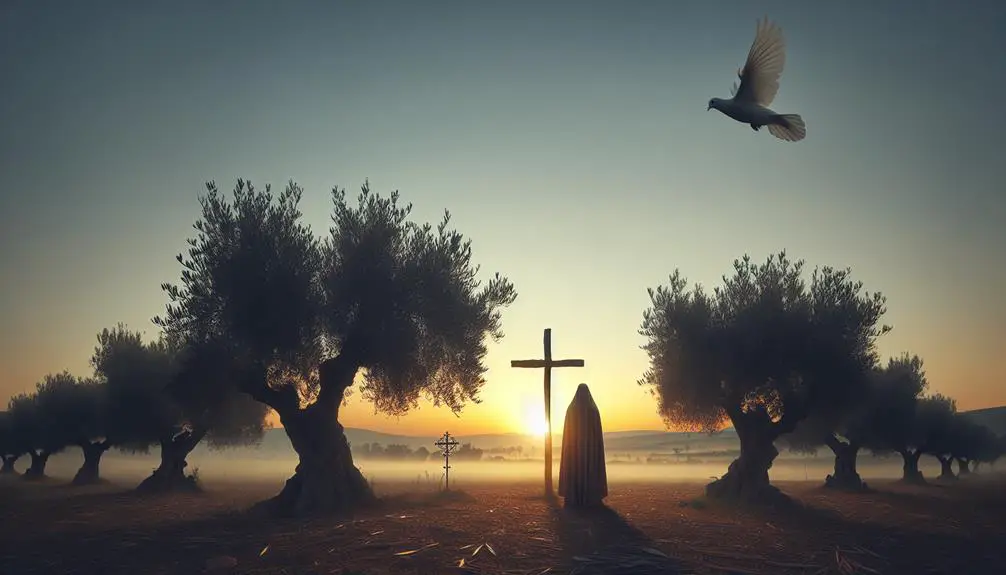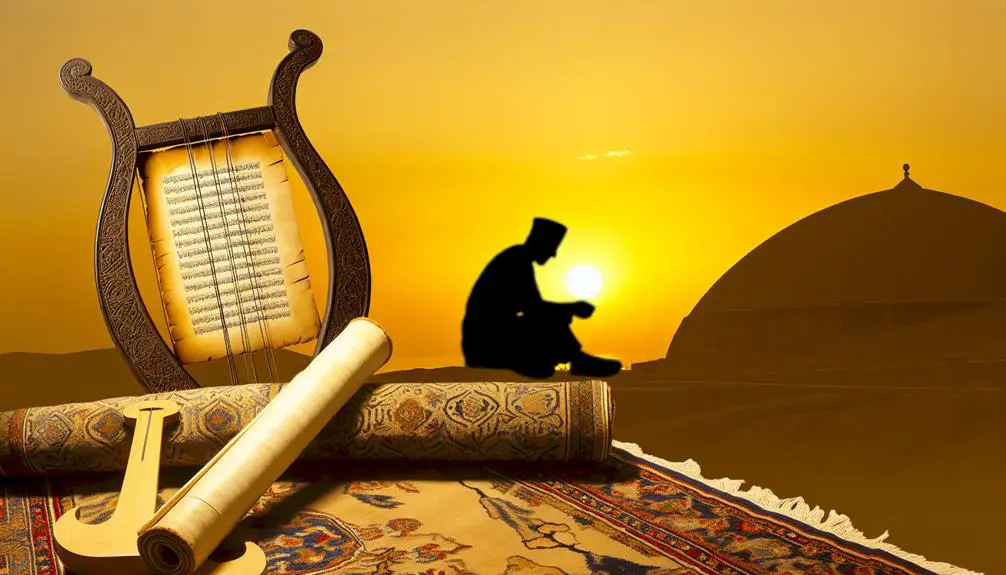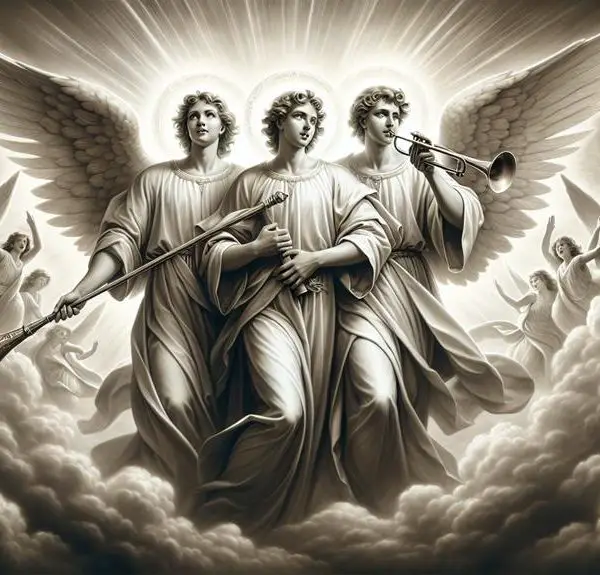Uncover the profound significance of morning in the Bible, where dawn marks moments of beginnings, hope, and renewal.

Morning in the Bible
You've likely heard theories that mornings hold a special significance in the Bible, but have you ever wondered why? From the creation narrative to the resurrection at dawn, these pivotal moments are not just coincidences but weave a pattern that speaks volumes about beginnings and renewal.
Each instance, whether it's the manna in the morning or the morning prayers and psalms, carries a deeper meaning that's waiting to be uncovered. Let's explore what these moments tell us about the nature of faith and hope, and why they might just change the way you view the start of each day.
Key Takeaways
- Morning rituals in the Bible symbolize renewal, purity, and a fresh start for the faithful.
- Morning offerings and sacrifices underscore a commitment to and dependence on the divine.
- Events occurring at dawn, such as the Red Sea crossing and the resurrection, carry deep symbolic meanings of freedom and rebirth.
- Incorporating psalms and prayers into morning practices fosters a sense of community and personal devotion among believers.
The Creation Narrative

In the biblical Creation narrative, God's act of bringing the universe into existence unfolds with a structured elegance that highlights both the power and intentionality behind the creation of the world. This narrative meticulously employs evening parallels and nighttime creations to underscore a profound theological and cosmological message. You'll notice that each day of creation begins with the phrase, 'And there was evening, and there was morning,' suggesting not just the passage of time but also the deliberate pacing of creation's orchestration.
Evening parallels serve as a prelude to the transformative actions that occur under the cloak of night, leading to the emergence of light and life with each subsequent morning. This cyclical pattern isn't merely about the transition from darkness to light; it's a symbolic representation of order emerging from chaos, of potentiality being realized through divine intention. Nighttime creations, thus, aren't just incidental; they're foundational to understanding the rhythm and flow of the creative process. They remind you that in the biblical worldview, darkness precedes light, suggesting that renewal and beginnings often follow periods of obscurity and unknowing.
Significance of Morning Offerings
You'll find that morning offerings in the Bible carry a profound purpose, acting as a bridge between humanity and the divine.
Through examining biblical examples and teachings, you'll uncover how these practices were rooted in a desire to honor God at the day's start.
This exploration reveals the spiritual significance imbued in these acts, highlighting their role in shaping a devout life.
Purpose of Morning Sacrifices
The purpose of morning sacrifices in the Bible reflects a profound dedication to starting each day with an act of worship and submission to God. This practice isn't merely ritualistic; it embodies the principles of daily renewal and ritual discipline, which are central to maintaining a steadfast relationship with the divine.
By offering sacrifices at the dawn of each day, you're participating in a symbolic act that reaffirms your commitment to God and acknowledges His sovereignty over all aspects of life. This daily act serves as a spiritual reset, reinforcing the importance of humility, gratitude, and the pursuit of righteousness.
Through this lens, morning sacrifices aren't just religious duties but are integral to fostering a life of continual spiritual growth and reflection.
Biblical Examples and Teachings
Exploring biblical narratives reveals the profound significance of morning offerings as moments of divine connection and spiritual renewal. These practices, deeply embedded within the fabric of ancient worship, stand in stark contrast to the evening rituals and nocturnal visions that punctuate the biblical landscape.
Morning offerings, as chronicled, weren't mere adjuncts to religious life but pivotal events that reaffirmed the covenant between the divine and the devout. They served as a bridge from the vulnerability and reflection triggered by the night's darkness to the clarity and action inspired by the day's light. This transition underscores a theological motif: the faithful's journey from darkness into light, guided by rituals that both demarcate and sanctify the passage of time.
Spiritual Significance Explored
Having considered the pivotal role of morning offerings within ancient worship practices, it's now imperative to examine their deeper spiritual significance and how they shaped the covenantal relationship between the divine and the devout.
Daybreak symbolism, inherent in morning rituals, represents renewal, purity, and a fresh start. This symbolism isn't incidental but foundational, shaping the daily rhythms of faith communities.
Morning offerings, then, aren't mere acts of ritual obedience but profound expressions of faith and dependence on the divine. They underscore a commitment to start each day by prioritizing spiritual values and seeking divine guidance. This practice cultivates a mindset of reverence and preparedness, setting a tone of sanctity and purpose for the day ahead.
Through these rituals, the faithful are reminded of their place within a larger, sacred narrative.
Dawn of the Red Sea Crossing
As you reflect on the narrative of the Red Sea Crossing, consider the dawn as not just a backdrop but a pivotal moment in biblical history. The miraculous passage opening at dawn underscores a divine intervention that's both timely and symbolic.
Meanwhile, Pharaoh's army's pursuit, set against this early morning scene, highlights the stark contrast between divine provision and human obstinacy.
Miraculous Passage Opening
Witnessing the dawn of the Red Sea crossing, the Israelites experienced a miraculous passage opening, symbolizing divine intervention and freedom from Egyptian bondage. This pivotal moment is a testament to the power of faith and the divine's capability to alter natural phenomena to guide and protect. The opening of the Red Sea represents not just a physical passage but a spiritual journey from oppression to liberation.
Aspect |
Significance |
Contextual Link |
|---|---|---|
Evening miracles |
Prelude to dawn's deliverance |
Transition from despair to hope |
Nighttime faith |
Foundation of the miraculous event |
Sustained belief through the darkest hours |
Divine intervention |
Core of the passage opening |
Manifestation of power and guidance |
This event encapsulates the essence of miraculous intervention amidst despair, highlighting the perpetual cycle of evening miracles leading to nighttime faith and culminating in the dawn of deliverance.
Pharaoh's Army Pursuit
Following the miraculous opening of the Red Sea, Pharaoh's army pursued the Israelites, embodying the persistent threat even amidst divine intervention. This episode showcases a stark juxtaposition between divine will and human obstinacy.
The Egyptian military strategies, honed through centuries of empire-building, suddenly found themselves nullified by an act of divine intervention. This pursuit, while initially seeming like a tactical advantage for Pharaoh's forces, underscores a deeper theological motif: the supremacy of divine providence over human machinations.
The Israelites' escape, facilitated by this extraordinary event, isn't just a tale of survival. It's a testament to the belief that no earthly power, regardless of its military prowess, can thwart a divine decree. This narrative invites you to ponder the limits of human agency when faced with the divine.
Manna in the Morning

In the context of biblical narratives, you'll find that manna's appearance each morning represented not only a divine provision but also a test of obedience and trust for the Israelites. This heavenly food, which appeared with the dew at dawn during their wilderness wandering, became a cornerstone of their daily sustenance. Its daily collection, with a double portion before the Sabbath, underscored a rhythm of reliance and rest that shaped their spiritual and physical well-being.
The story of manna in the morning brings to light several key insights:
- Divine Provision: Manna symbolized God's unwavering care and provision, ensuring the Israelites' survival in harsh conditions.
- Test of Obedience: Collecting only what was needed for the day, except before the Sabbath, taught discipline and trust in God's ongoing provision.
- Daily Sustenance: It highlighted the importance of daily dependence on God for both physical and spiritual nourishment.
- Spiritual Significance: Beyond mere physical sustenance, manna represented a deeper spiritual truth about God's presence and provision that sustained the Israelites beyond their wilderness wandering.
Analyzing manna's provision each morning reveals a rich tapestry of themes around faith, obedience, and the sustenance of life itself.
The Resurrection at Dawn
The dawn resurrection narrative not only marks a pivotal moment in Christian theology but also embodies themes of rebirth and divine intervention, challenging believers to reflect on the significance of new beginnings and God's power to transcend death. This moment, encapsulated in the early hours, intertwines deeply with Easter symbolism, where dawn metaphors illuminate the path from darkness to light, signifying Jesus Christ's victory over death.
Aspect |
Significance |
|---|---|
Light |
Symbolizes the divine truth and the dispelling of spiritual darkness. |
Dawn |
Represents rebirth and the hope of a new day. |
Empty Tomb |
Embodies the ultimate triumph over death. |
First Witnesses |
Highlights the role of faith and witness in the Christian journey. |
Easter Morning |
Serves as a reminder of eternal life and redemption. |
This tableau, rich in symbolism, invites a meditative engagement with the concepts of renewal and salvation. The resurrection at dawn doesn't just recount a historical event; it serves as a profound metaphor for spiritual awakening. As dawn breaks, it not only heralds a new day but also offers a moment of reflection on the transformative power of faith and the promise of new life, echoing throughout the tapestry of Christian belief.
Morning Prayers and Psalms

Delving into the realm of morning prayers and psalms, you'll uncover a rich tradition that serves not only as a daily spiritual practice but also as a foundational element in Christian worship and personal devotion. This practice embodies the essence of sunrise devotion and awakened worship, anchoring believers in a posture of reverence and gratitude from the day's start.
Analyzing this tradition reveals several key aspects:
- Historical Roots: The incorporation of psalms into morning prayers dates back to ancient times, reflecting the psalmists' inclinations to seek God at dawn, a symbol of new beginnings and divine mercy.
- Theological Significance: Morning prayers and psalms are steeped in theological meaning, emphasizing God's faithfulness, protection, and guidance. They serve as a reminder of God's omnipresence and the believer's dependence on divine providence.
- Psychological Impact: Engaging in sunrise devotion and awakened worship sets a tone of positivity and spiritual mindfulness, impacting one's outlook and interactions throughout the day.
- Communal Aspect: While personal, these practices also foster a sense of community and shared faith, as believers worldwide unite in a common rhythm of worship and reflection at dawn.
In essence, morning prayers and psalms are a vital aspect of Christian life, weaving together historical depth, theological richness, personal solace, and communal unity.
Frequently Asked Questions
How Does the Concept of Morning in the Bible Relate to Modern Scientific Understandings of Time and the Beginning of the Day?
When you explore how modern science defines time and the day's start, it's fascinating to connect it with morning rituals and dawn symbolism.
Science sees the day beginning at midnight, based on astronomical observations, quite different from the biblical perspective, where a day starts at sunset.
This contrast enriches your understanding of time, blending scientific precision with the profound symbolism found in morning rituals, offering a holistic view of daybreak's significance.
Are There Specific Biblical Figures Who Had Significant Revelations or Visions in the Morning, Outside of the Contexts Provided?
You're exploring a landscape where dawn reveals more than just daylight. Consider Jacob, who, after a night of wrestling, emerged with not just a limp but a new identity at daybreak.
Similarly, Gideon tested God's will with fleece at dawn, seeking clarity in the morning dew. These narratives aren't mere stories; they're allegories for transformation and divine clarity that come with the first light, offering deep, scholarly insights into the significance of morning revelations.
How Does the Portrayal of Morning in the Bible Compare With Its Depiction in Other Ancient Religious Texts or Cultures?
When you compare dawn symbolism in the Bible to other ancient texts, you'll find fascinating cultural comparisons.
Many cultures view morning as a symbol of new beginnings and hope, much like in biblical narratives. However, the specific attributes and sacredness attributed to dawn can vary widely.
What Are the Psychological or Spiritual Implications of Morning as a Symbol in Biblical Narratives, Beyond the Specific Events Mentioned?
You're diving into how morning embodies psychological and spiritual renewal.
Think of dawn breaking after the longest night—it's not just a new day but a powerful renewal symbolism.
In biblical narratives, this moment isn't merely a transition from darkness to light; it's a profound hope metaphor.
Morning signifies a fresh start, an opportunity for redemption and transformation, deeply ingrained in the human psyche, echoing our innate longing for renewal and hope.
In What Ways Does the Bible Address the Transition From Night to Morning in Terms of Personal or Community Purification Rituals Not Covered in the Given Sections?
You're exploring how transitions from night to morning, specifically through morning prayers and sunrise offerings, play a role in personal and community purification processes. These practices, deeply rooted in tradition, symbolize a cleansing and a new beginning at the start of each day.
They're not just rituals; they represent a profound spiritual renewal and commitment to a purified state of being, both individually and collectively, highlighting a cycle of rebirth and reflection.
Conclusion
In the grand tapestry of biblical narrative, mornings don't just whisper; they roar with the promise of divine intervention and human transformation. From the first sunrise in Eden, scorching across the sky like a chariot of fire, to the resurrection dawn that shattered death's chains with the brilliance of eternal hope, mornings in the Bible aren't mere transitions from night to day.
They're God's megaphone, broadcasting His power, faithfulness, and love. Each dawn, scripture shows, is a divine manuscript, awaiting our awe-struck reading.



Sign up